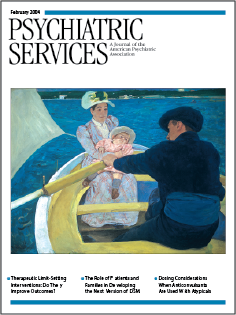Bridging Psychiatric Services Between Asia and America
To the Editor: In the October issue of Psychiatric Services, Dr. Chen and his colleagues described the Bridge Program in New York to improve access to psychiatric services among Asian consumers (1). The authors explained that a primary reason for developing the Bridge Program is the profound stigma associated with mental illness in Asian-American communities, which is a major cause for the low use of mental health facilities. I am in full agreement with Dr. Chen's team on this issue. A recent study in Hong Kong, in which 11 interviews were conducted with patients' relatives to explore the relationship between stigma, accessibility of mental health facilities, and family burden, yielded the same conclusion (2). Data analyses showed that much of the burden was related to stigma and to a lack of mental health and rehabilitation services. Consequences included the families' social isolation, patients' difficulties obtaining competitive employment, and financial difficulties for both patients and families.
One of the salient features of the Bridge Program is its goal of enhancing the skills of primary care providers to improve identification and treatment of mental disorders. I am delighted that the program is a success. I would like to propose another component for the Bridge Program, if the authors are interested. The program should encourage exchange of information about research and services between Asia and America. The importance of addressing cross-cultural differences in the development of instruments for psychiatric research has been widely recognized. I believe it is equally applicable in the development of treatment protocols. As a psychiatric researcher in Asia, I have found that advances in psychiatric rehabilitation in America have helped me to better direct my research efforts. By the same token, I believe that the outcomes of research conducted by my group and by other researchers in Asia will be of help to researchers and practitioners in America who work with the Asian population.
My primary concern is to ensure the effectiveness of the programs that my group has developed for use in the Asian context. However, I would be most delighted to learn that the culturally relevant assessment instruments and treatment programs we have developed in Asia can be successfully applied among Asian Americans. Assessments developed and validated in Hong Kong, such as the Workshop Behavior Checklist (3) and the Vocational Social Skills Scale (4), may be useful with Chinese Americans. Similarly, the integrated supported employment program (5) and the Chinese version of the basic conversations skills module on which we are currently working might also be helpful to American practitioners who work with Chinese Americans.
In summary, facilitation of exchange of information about research and services will further enhance the Bridge Program.
Dr. Tsang is affiliated with the department of rehabilitation sciences at Hong Kong Polytechnic University.
1. Chen H, Kramer EJ, Chen T: The Bridge Program: a model for reaching Asian Americans. Psychiatric Services 54:1411–1412, 2003Link, Google Scholar
2. Tsang HWH, Tam, PKC, Chan F: Sources of family burden of individuals with mental illness. International Journal of Rehabilitation Research 26:123–130, 2003Crossref, Medline, Google Scholar
3. Tsang HWH, Ip YC: Development and validation of the Workshop Behavior Checklist: a scale for assessing work performance of people with severe mental illness. International Journal of Social Psychiatry 46:110–121, 2000Crossref, Medline, Google Scholar
4. Tsang HWH, Pearson V: Reliability and validity of a simple measure for assessing the social skills of people with schizophrenia necessary for seeking and securing a job. Canadian Journal of Occupational Therapy 67:250–259, 2000Crossref, Medline, Google Scholar
5. Tsang HWH: Augmenting vocational outcomes of supported employment by social skills training. Journal of Rehabilitation 69:25–30, 2003Google Scholar



